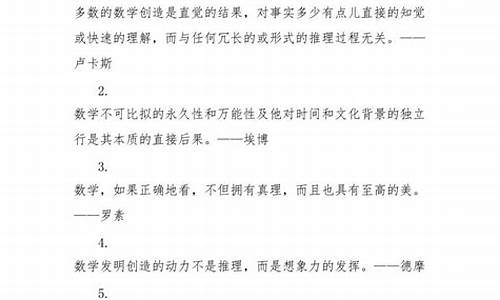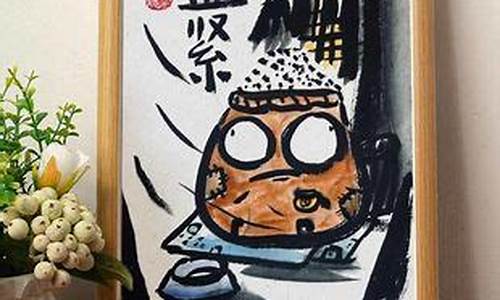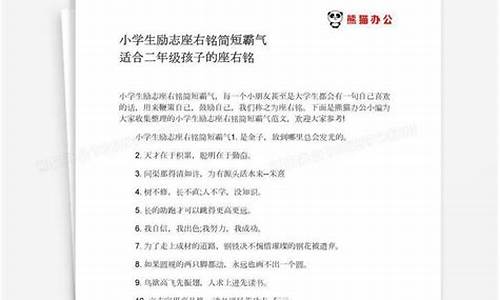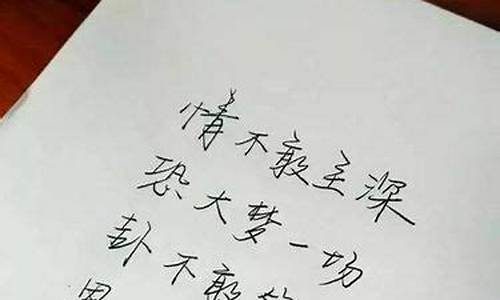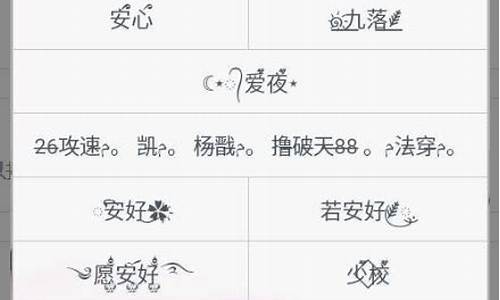您现在的位置是: 首页 > 名人语录 名人语录
英语翻译中文的句子翻译_英语翻译成中文的句子
tamoadmin 2024-08-22 人已围观
简介1.用英语翻译两个中文句子(汉译英)2.有哪些外语句子十分复杂,翻译成中文言简意赅的句子?3.急求100句英语优秀句子,不要太长,带中文翻译。4.英语句子,越短越好,100个100分,要中文翻译5.求用英语翻译5个中文句子6.英语翻译中形合与意合的例子7.5个英语句子翻译成中文,速度,在线等~!It is a rewarding journey.这是一次收获之旅(言简意赅)。(或,这是一次收获颇丰
1.用英语翻译两个中文句子(汉译英)
2.有哪些外语句子十分复杂,翻译成中文言简意赅的句子?
3.急求100句英语优秀句子,不要太长,带中文翻译。
4.英语句子,越短越好,100个100分,要中文翻译
5.求用英语翻译5个中文句子
6.英语翻译中形合与意合的例子
7.5个英语句子翻译成中文,速度,在线等~!
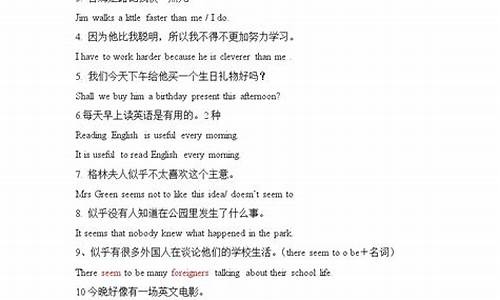
It is a rewarding journey.
这是一次收获之旅(言简意赅)。(或,这是一次收获颇丰的旅行。)
1。We he with us at the reception…
这句话的意思根据我的理解应该是:参加本次招待会的有…(罗列人名)
2。Allow me, first of all, to express our cordial welcome to our distinguished guests.
译:首先,请允许我向各位尊贵的客人表示热烈的欢迎!
3.It gives us great pleasure to entertain our distinguished guests here.
译:能在此招待各位,我们实感荣幸。
4.Renew our old friendship.
重续旧日友谊.
5.Comments are welcome./Your advice will be reciated.
我们欢迎您的批评、指教。
6.Do you still feel the jet lag?
您时差倒过来了吗?(jet lag - 时差症:由于在喷气飞机上快速跨越几个时区而造成的短暂的身体节律的紊乱)
7.Today we gather here to solemnly commemorate…
今天,我们齐聚这里,隆重地纪念…
8.Your presence just honors this meeting.
您能出席这次会议,我们倍感荣幸。
9.On behalf of all my colleagues, I would like to extend our warm welcome to you.
我代表所有的同事,向你表示最热烈的欢迎。
10.With a sense of great sorrow we bid farewell to…
怀着沉痛的心情,我们向…道别(或者根据后文,译作:我们告别了…)。
11.Let us toast to our long-standing/time-honored friendship.
让我们举杯,祝愿我们的友谊地久天长!(或者口语化一点:愿我们的友谊地久天长,干杯!)
12.We go back with a full load of friendship.
带着友谊与祝福,我们满载而归。(稍微意译了一些,毕竟意译也是翻译的技巧之一嘛)
手工翻译~
用英语翻译两个中文句子(汉译英)
手机的微信扫一扫功能就可以直接扫描英语翻译为中文。
操作方法:
1、首先,打开手机里面的微信,并点击进入。
2、进入到微信里面,选择下方的发现,再选择上方的扫一扫选项。
3、然后再选择翻译,可以直接扫描英语文章或者从手机里面选择文章。
4、这样就可以直接对文章进入扫一扫翻译了。
5、扫描完毕,就会显示出翻译的结果出来了。
在应用商店有许多翻译软件是支持“拍照翻译”功能的,具体使用方法如下(这里演示以有道翻译官为例):
1、在手机应用市场下载有道翻译官,安装完成后打开应用,在界面的底部有拍照翻译栏目,点击进入。
2、稍等片刻进入相机取景页面,在顶部可以选择翻译的语言选择,根据个人需要选择需要翻译的语言。
3、在拍照时,需要注意文字尽量平行于参考线拍摄。
4、翻译需要一定的时间,待翻译完成后,页面会显示翻译的结果,至此翻译完成。
有哪些外语句子十分复杂,翻译成中文言简意赅的句子?
1.星期天是Carol的妈妈的生日,所以她给了妈妈一份礼物。(过去式)
Sunday was Carol's mother's birthday, so she ge her mother a present.
2.一位美国妈妈找不到她的双胞胎(Liza和Peter)
An American mother couldn't find her twins (Liza and Peter)
或一位妈妈的双胞胎走丢了(要用“lost”)
A mother lost her twins.
急求100句英语优秀句子,不要太长,带中文翻译。
The fire is the test of gold;adversity of strong man.?
烈火试真金,困苦炼壮士.这句话是很有道理的,面对困难绝对不要轻易退缩,要勇敢的面对这一切,也许在灾难之后就是灿烂的阳光。
英语句子,越短越好,100个100分,要中文翻译
1. Pain past is pleasure.(过去的痛苦就是快乐。)[无论多么艰难一定要咬牙冲过去,将来回忆起来一定甜蜜无比。]
2. While there is life, there is hope.(有生命就有希望/留得青山在,不怕没柴烧。)
3. Wisdom in the mind is better than money in the hand.(脑中有知识,胜过手中有金钱。)[从小灌输给孩子的坚定信念。]
4. Storms make trees take deeper roots.(风暴使树木深深扎根。)[感激敌人,感激挫折!]
5. Nothing is impossible for a willing heart.(心之所愿,无所不成。)[坚持一个简单的信念就一定会成功。]
6. The shortest answer is doing.(最简单的回答就是干。)[想说流利的英语吗?那么现在就开口!心动不如嘴动。]
7. All things are difficult before they are easy.(凡事必先难后易。)[放弃投机取巧的幻想。]
8. Great hopes make great man. (伟大的理想造就伟大的人。)
9. God helps those who help themselves.(天助自助者。)
10. Four short words sum up what has lifted most successful individuals above the crowd: a little bit more.(四个简短的词汇概括了成功的秘诀:多一点点!)[比别人多一点努力、多一点自律、多一点决心、多一点反省、多一点学习、多一点实践、多一点疯狂,多一点点就能创造奇迹!]
11. In doing we learn.(实践长才干。)
12. East or west, home is best.(东好西好,还是家里最好。)
13. Two heads are better than one.(三个臭皮匠,顶个诸葛亮。)
14. Good company on the road is the shortest cut.(行路有良伴就是捷径。)
15. Constant dropping wears the stone.(滴水穿石。)
16. Misfortunes never come alone/single.(祸不单行。)
17. Misfortunes tell us what fortune is.(不经灾祸不知福。)
18. Better late than never.(迟做总比不做好;晚来总比不来好。)
19. It's never too late to mend.(过而能改,善莫大焉;亡羊补牢,犹未晚也。)
20. If a thing is worth doing it is worth doing well.(如果事情值得做,就值得做好。)
21. Nothing great was ever achieved without enthusiasm.(无热情成就不了伟业。)
22. Actions speak louder than words.(行动比语言更响亮。)
23. Lifeless, faultless.(只有死人才不犯错误。)
24. From small beginning come great things.(伟大始于渺小。)
25. One today is worth two tomorrows.(一个今天胜似两个明天。)
26. Truth never fears investigation.(事实从来不怕调查。)
27. The tongue is boneless but it breaks bones.(舌无骨却能折断骨。)
28. A bold attempt is half success.(勇敢的尝试是成功的一半。)
29. Knowing something of everything and everything of something.(通百艺而专一长。)
30. Good advice is beyond all price.(忠告是无价宝。)
自己baidu或者google 一下,很多的。
求用英语翻译5个中文句子
越短越好的英语句子:
1. This is a ship.(这是一艘船。)
2. He is an old worker.(他是一个老工人。)
3. I he a brother and a sister.(我有一个兄弟和一个姐妹。)
4. There is a map on the wall.(墙上有一幅地图。)
5. This is a yellow pencil.(这是一支黄铅笔。)
6. Tom is an American boy.(Tom是个美国男孩。)
7. English is a useful tool.(英语是一种有用的工具。)
8. He is telling them an interesting story.(他正在给大家讲一个有趣的故事。)
9. Britain is a European country.(不列颠是一个欧洲国家。)
10. It takes an hour and a half to get there.(这要花费一小时半到达那里。)
11. It is a pig.(它是一头猪。)
12. It is cotton.(它是棉花。)
13. It is wheat.(它是麦子。)
14. It is a cow.(它是一头母牛。)
15. It is an orange.(它是一只橘子。)
16. It is rice.(它是稻子。)
17. It is an ox.(它是一头公牛。)
18. It is a duck.(它是一只鸭子。)
19. It is water.(它是水)
20. It is a hen.(它是一只母牛。)
21. Today is Monday. Tomorrow is Tuesday.(今天是星期一。明天是星期二。)
22. Today is Wednesday. Tomorrow is Thursday.(今天是星期三。明天是星期四。)
23. Today is Friday. Tomorrow is Saturday.(今天是星期五。明天是星期六。)
24. Today is Saturday. Tomorrow is Sunday.(今天是星期六。明天是星期日。)
25. Today is Sunday. Tomorrow is Monday.(今天是星期日。明天是星期一。)
We are workers.(我们是工人。)
26. My sister and I are both pupils.(我的姐妹和我都是学生。)
27. You are all middle school pupils.(你们都是中学生。)
28. They are trees and flowers.(它们是树和花。)
29. Cats and dogs are animals.(猫和狗是动物。)
30. All of them are teachers.(他们都是教师。)
31. The sun is red.(太阳是红色的。)
32. That table is hey.(那张桌子很重。)
33. I am six.(我十六岁。)
34. Class is over.(课结束了。)
35. The river is faraway.(这条河很远。)
36. Time is up.(时间到了。)
37. The bottle is full of water.(这瓶子装满了水。)
38. I am from Shanghai.(我来自上海。)
39. Comrade Wang is out.(王同志外出了。)
40. The football match is on.(足球比赛开始了。)
41. The boy is over there.(那男孩在那边。)
42. My brother is at home.(我的兄弟在家里。)
43. He is not here.(他不在这里。)
44. She is good at swimming.(她擅长游泳。)
45. I am fond of sports.(我很喜欢运动。)
46. I am tired.(我很累。)
47. You are ill.(你病了。)
48. It is hot today.(今天很热。)
49. The weather is cold.(天气很冷。)
50. It is fine.(这个很好。)
51. The play is good.(这场演出很好。)
52. Snow is white.(雪是白的。)
53. The streets are clean.(街道是干净的。)
54. This hall is full of people.(这个大厅挤满了人。)
55. The library is open.(图书馆开门了。)
56. The film is on.(影片上映了。)
57. My uncle is over there.(我的叔叔在那边。)
58. The cinema is far away.(**院很远。)
59. The light is off.(灯暗了。)
60. My father is out.(我的父亲外出了。)
61. Her brother is thir.(她的兄弟十三岁。)
62. I am eigh.(我十八岁。)
63. Mr. Smith is from American.(史密斯先生来自美国。)
64. The boys in our class are fond of football.(我们班的男孩很喜欢足球。)
65. Wang Ying is good at music.(王英擅长音乐。)
66.I he a brother.(我有一个兄弟。)
67. He has two English books.(他有两本英语书。)
68. We he a lot of paper.(我们有许多纸。)
69. You he many friends.(你有许多朋友。)
70. My sister has a pen and a ball-pen.(我的姐妹有一支铅笔和一支圆珠笔。)
71. Her classmates he a small library.(她的同班同学们有一个小图书馆。)
72. Our school has twenty classes.(我们的学校有二十个班级。)
73. I he some bread and jam.(我有一些面包和果酱。)
74.There is a teacher’s desk in the classroom.(教室里有一只讲台。)
75. There are forty pupils in the playground.(操场上有四十个学生。)
76. There are some desks and chairs in the office.(办公室里有一些书桌和椅子。)
77. There are two blackboards on the wall.(墙上有两块黑板。)
78. There are four lights in the classroom.(教室里有四盏灯。)
79. There is a loud-speaker in the hall.(大厅里有一只喇叭。)
80. There are two portraits above the blackboard.(黑板上方有两张像。)
81. There is a map and two pictures in the reading-room.(阅览室里有一幅地图和两幅画。)
82.Your pencil is blue. Mine is blue, too.(你的铅笔是蓝色的。我的也是蓝色的。)
83. His book is new. Hers is new, too.(他的书是新的。她的也是新的。)
84. Our classroom is big. Theirs is big, too.(我们的教室很大。他们的也很大。)
85. Her brother is a worker. His is a worker, too.(她的兄弟是一个工人。他的也是一个工人。)
86. Their house is near the park. Ours is near the park, too.(他们的房子在公园附近。我们的也在公园附近。)
87. His room is tidy. Yours is tidy, too.(他的房间很整洁。你的也很整洁。)
88. My sister is not here. Hers is not here, either.(我的妹妹不在这里。她的也不在这里。)
89. Our classroom is not on the first floor. Theirs is not on the first floor, either.(我们的教室不在二楼。他们的也不在二楼。)
90. Your father is not a teacher. Mine is not a teacher, either.(你的父亲不是一个教师。我的也不是一个教师。)
91. Their library is not big. Ours is not big, either.(他们的图书馆不大。我们的也不大。)
92. How nice the song is!(这首歌多么好听啊!)
93. What a wonderful time we’re had!(我们过了一段多么美好的时光啊!)
94. How fast the dog runs!(这只狗跑得多么快啊!)
95. What a clever boy he is!(他是一个多么机灵的男孩啊!)
96. What beautiful music they’re playing!(他们正在演奏多么优美的音乐啊!)
. How quickly time flies!(时间飞逝得多么快啊!)
98. What an excellent idea you’re got!(你有一个多么出色的主意啊!)
99. What a dear little child he is!(他是一个多么可爱的小孩啊!)
100. He is telling us an interesting story.(他正在给我们讲一个有趣的故事。)
101. We are hing a holiday today.(今天我们正在度。)
102. What are you doing these days?(这几天你正在做什么?)
103. You are speaking so quickly, I can’t understand you.(你这么快地讲着,我没能搞懂你。)
104. Jane’s studying in our school this term. She is preparing her lessons now.(这学期珍妮在我们学校学习。她现在正在准备功课。)
105. Can I use your dictionary for a moment? I’m sorry, but I am using it now.(我能用一下你的词典吗?很抱歉,我现在正在用。)
106. They are doing their best to finish the work in time.(他们正在努力及时完成这项工作。)
107. She is speaking.(她正在讲话。)
108. The children are singing.(孩子们正在唱歌。)
109. I am listening to the radio.(我正在听无线电。)
110. My brother is writing.(我兄弟正在写字。)
111. We are preparing our lesson.(我们正在准备功课。)
112. Our teachers are hing a meeting.(我们的老师正在开会。)
113. The dog is running very fast.(狗正在非常快地跑着。)
114. Your sister is looking for her pen.(你的姐妹正在找她的钢笔。)
115. see a map on the wall.(我看见墙上的一张地图。)
116. My father works in a factory.(我的父亲在工厂工作。)
117. The pupils often play games in the playground.(学生们经常在操场上玩游戏。)
118. Tom and his sister often clean the room together in the morning.(汤姆和他的妹妹经常在早晨打扫房间。)
119. She studies politics, Chinese and other subjects.(她学习政治、语文和其他课目。)
120. The boys pass by the bookstore every day on their way to school.(孩子们每天在上学路上经过书店。)
121. My brother and I wash our clothes every day.(我兄弟和我每天洗我们的衣服。)
122. Our parents usually go to work at seven.(我们的父母通常在七点钟去上班。)
123. Birds fly south in winter.(鸟在冬天飞往南方)
124. Mary lives in New York.(玛丽住在纽约。)
125. We always get up early.(我们总是起床很早。)
126. He usually goes to bed at nine.(他通常九点上床。)
127. It often rains in spring.(天天常常下雨。)
128. I sometimes go to the park.(我有时去公园。)
129. She seldom comes late.(她不常迟到。)
130. Li-li never tells a lie.(丽丽从不撒谎。)
131. I often go to the cinema.(我常常去**院。)
132. He seldom forgets to do his homework.(他不常忘记做回家作业。)
133. The boy usually goes to school at 7.30.(那男孩通常七点半去上学。)
134. She never talks to her teacher that way.(她从不以那种方式跟老师谈话。)
135. He usually studies in the reading-room.(他通常在阅览室里学习。)
136. We always listen to the radio at 8.00 p. m.(我们总是在上午八点听无线电。)
137. John sometimes watches television in the evening.(约翰有时在晚上看电视。)
138. Wang Fang never comes to school late.(王芳来上学从不迟到。)
139. They are always busy.(他们总是很忙。)
140. I don’t usually take a bath at noon.(我通常不在中午洗澡。)
141. Do you often work so late?(你常常工作得这么晚吗?)
142. This is sometimes true.(这有时是真实的。)
143. We can seldom do it without his help.(没有他的帮助,我们很少能做到。)
144. It is not going to be cold next month.(下个月不会马上很冷。)
145. He is always ready to help people.(他总是助人为乐。)
146. You must never do it again.(你千万不能再做这件事。)
147. She is seldom late for school.(她上学不常迟到。)
148. Do you often read the newspaper after supper.(你常常在晚饭后看报吗?)
149. Tom doesn’t usually wake up so early.(汤姆通常不醒得这么早。)
150. Mary can sometimes choose the right thing.(玛丽有时会选择正确的事情。)
151. Does he usually he breakfast at six?(他通常在六点钟吃早饭吗?)
152. The boys are seldom absent from school.(男生们不常缺课。)
153.Now I am reading the newspaper.(现在我正在看报纸。)
154. We are not going to play basket-ball after school.(我们不打算放学后打篮球。)
155. The workers are building a big ship these days.(这几天工人们正在造一条大船。)
156. The pupils are visiting a photo show now.(学生们现在正在参观摄影展览。)
157. We often play basket-ball with Class Three.(我们常常与三班打篮球。)
158. Wang Ling does a lot of housework every evening, but today he is helping his brother with his lessons.(王林每天晚上做许多家务,但今天正在帮助弟弟温习功课。)
159. I am going to study French next year.(我打算明年学法语。)
160. I am going to read the book this morning.(我打算今晚看这本书。)
161. She is going to help her classmate later.(她打算最近帮助她的同学。)
162. It is going to snow very soon.(过不了多久就要下雪了。)
163. We are going to go to Peking the day after tomorrow.(我们打算后天去北京。)
164. You are going to be middle school pupils next autumn.(你们明年秋季就要成为中学生了。)
165. They are going to visit the museum next week.(他们准备下星期参观博物馆。)
166. They are not going to stay here.(他们不打算住在那里。)
167. She is not going to mend her shoes.(她不打算补自己的鞋。)
168. You are not going to he an English lesson tomorrow.(你们没明天上英语课。)
169. I am not going to watch TV today.(我不打算今天看电视。)
170. You are not going to see the film next Sunday.(你们不打算下星期天看这部**。)
171. He is not going to write to his father tonight.(他不打算今晚写信给他父亲。)
172. I shall be at middle school next year.(明年我将要读中学。)
173. You will hear the news tonight.(今夜你将会听到这条消息。)
174. He will tell it to you the day after tomorrow.(他将会在后天把这件事告诉你。)
175. She will play volley ball after school.(放学后她要打排球。)
176. It will be cold tomorrow.(明天要冷了。)
177. The baby will be able to walk soon.(这婴儿不久就能走路了。)
178. We shan’t be middle school pupils next year.(我们不会在明年成为中学生的。)
179. She won’t read the book this evening.(她今晚不会看这本书。)
180. They won’t see the film this week.(他们这星期不会去看这部**。)
181. You won’t hear from him tonight.(你不会在今夜收到他的信。)
182. I shan’t be six until early next month.(我到下个月月初才十六岁。)
183. They won’t be able to come this evening.(他们今晚不能够来了。)
184. There will be a football match next Sunday.(下星期天将有一场足球赛。)
185. There will be more new machines in the workshop.(车间里将有更多的新机器。)
186. There won’t be any rain next few days.(过几天不会下雨。)
187. There will be several new film on next season.(下个季度会有几部新影片。)
188. We don’t go to school on Sunday.(我们星期天不上学。)
189. He does his homework in the evening.(他在晚上做回家作业。)
190. I first met him on a spring evening.(春天的一个晚上我第一次遇见他。)
191. My sister usually gets up at six o’clock.(我姐姐通常在六点钟起床。)
192. Her father lived in Tientsin at that time.(那时他父亲住在天津。)
193. We he dinner at a quarter to twelve.(我们十一点三刻吃饭。)
194. I left for Peking on September 11.(我是九月十一日赴北京的。)
195. Chang Hua is going to stay here next month.(张华打算下个月在这儿呆着。)
196. We are learning Lesson Ten this week.(这星期我们正在学第十课。)
1. She often works at night.(她常常在夜里工作。)
198. She worked late last night.(她昨夜工作得很晚。)
199. They went to the park the day before yesterday.(前天他们去过公园。)
200. It will be very hot next month.(下个月将会很热。)
100个给100分,300个给300分,200个为何只有150分?开玩笑的。只要能帮到你,给个5分就行了。
英语翻译中形合与意合的例子
1. As is known to all, water is the source of life.
2. Human beings would not exist without water.
3. We shall not waste water.
4. For instance, we should remember to turn off the tap after washing hands.
5. Please se water!
5个英语句子翻译成中文,速度,在线等~!
形合和意合是翻译中的两种方法。
形合指的是将源语言的词语或句子按照相同的结构和语法规则直接翻译成目标语言,以便保留原文的形式。例如:
- 中文句子:"我喜欢绿茶。"
- 直接的形合翻译:"I like green tea."
意合指的是在翻译的过程中,不只是将词语或句子逐字翻译,而是尝试表达相同的意思,以使得目标语言读者更好地理解翻译的内容。例如:
- 中文句子:"他是一个有经验的老师。"
- 意合翻译:"He is an experienced teacher."
以下是其他一些形合和意合的例子:
形合翻译:
- 中文句子:"我有一只小猫。"
- 直接的形合翻译:"I he a small cat."
意合翻译:
- 中文句子:"我家里有一只可爱的小猫。"
- 意合翻译:"I he a cute little cat at home."
形合翻译:
- 中文句子:"这本书很有趣。"
- 直接的形合翻译:"This book is interesting."
意合翻译:
- 中文句子:"我读这本书觉得很有趣。"
- 意合翻译:"I found this book interesting to read."
形合和意合的使用视情况而定。如果想要在目标语言中保留源语言的语法结构和词汇,或者需要强调原文的形式,形合翻译就是一个更好的选择。但是,如果目的是使得翻译的内容更好地传达给目标语言读者,那么意合翻译可能更为恰当。
一些情况下,还需要在形合和意合翻译之间进行选择。例如,如果源语言中使用了一些具有特定文化背景的词汇,那么在翻译时,可能需要使用意合翻译来确保目标语言读者能够理解这些词汇的含义。此外,如果源语言和目标语言在语法和结构上存在显著的不同,比如中英语言差异,那么意合翻译可能更适合。
因此,选择形合或意合翻译的方式要根据具体情况而定,目标是让翻译的内容更符合目标语言读者的理解和传达需求。
1.Students ofen want to practice their English outside class.
ofen 错了,应该是often
整句的意思是:学生常常想在课室外练习英语
2.Is okay to try to talk to foreigners I meet in the street?
在街上遇到外国人时,是否可以尝试和他们交谈呢?
3.Is't probably okay to talk to foreigners in public places.
在公众地方和外国人交谈是可行的
4.You can probably help him if he is new to China and if he is alone,you may make him feel welcome.
你或许能帮助第一次单独来中国的他,你会让他感觉到中国的人热情。
5.Talking to stangers is fun if you choose the right time and place.
当你适时地和陌生人交谈是很有趣的
